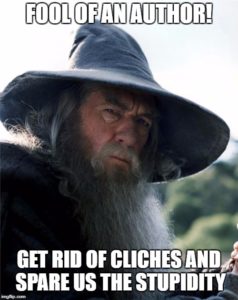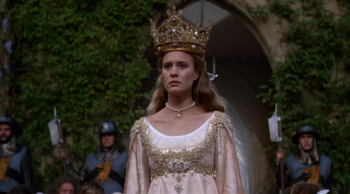Things Fantasy Authors Like to Write About—But Really Shouldn’t
Fantasy authors can be a strange breed.
Seeking to write stories that revel in imagination and whisk readers into other worlds…but at times fall painfully, woefully short.
To paraphrase Eomer, “We should not doubt their motivations, merely their execution.”
Because let’s face it—some fantasy stories should have stayed locked up in the castle room high in the turret.
When Fantasy Authors Write Boring Stories

Aragorn’s he-did-what? face … image via lotr.wikia.com
Because #elves and Tolkien lookalikes are the only way to make a fantabulous fantasy tale.
Not saying there’s anything inherently wrong with copying Tolkien. After all some Christopher guy wrote about Aragorn’s name alter-ego Eragon. It did pretty well. But still, as they say in science: don’t try this at home, kids.
Fantasy authors love to write all the fantasy things. Problem is, most of the time they really shouldn’t.
Things like…
Oohhh, other races. Yes, let’s use them and ignore the fact that they’re nearly identical to elves and dwarves and orcs. Or pretend like they’re different (you know, call them something else) even when they’re really not.
The Chosen One story arc. The world won’t be satisfied until every poor farmer boy becomes a hero.
A dark, brooding enemy that lurks in the background and never shows his face beyond the shadows.
Trilogies! Yay trilogies!
The stunningly beautiful love interest who’s probably related to a king or has immortal blood flowing through her veins.
Here we go a questing, across the world so green. Here we go a traveling so far to be seen (pro hint: has a much better ring if read to the tune of the Here We Come A Wassailing song).
Let’s form a company of important people who do a lot of walking and talking, interrupted by occasional fighting (see above).

Hark, the gray-haired mentor comes forth with tidings of destiny and fate and the ruin of the world. Also, a pipe and staff and scowly eyes.
The world is ending! The world is ending!
Loooonnng descriptions of scenery and character appearances and more scenery. We’re talking paragraphs that look like the outline of a Manhattan skyscraper.
The fair beauty and grace of the one whom the hero has the privilege of being loved by, even if he couldn’t even hold a sword in Chapter 1 and has a 50% chance of smelling like barnyard.
Characters: we have a plan but it’s not that great and the evil overlord is terribly powerful and impossible to defeat. But hurray, we have magic.
Evil overlord: I shall tell my enemies my plans and conveniently wait to kill them for the sake of the story.
Characters: woe upon us, the evil overlord has greater magic than do we.

Image via princessbride.wikia.com
Evil overlord: woe to me, for I still fail to triumph.
The princess who loves the commoner but is forced or coerced or tricked or guilted into marrying the cruel lord. Is there no compassion in the world?
Unpronounceable names that don’t believe in vowels and are disturbingly fond of apostrophes.
Chapters that rival Gandalf’s beard in length.
A big, black, doom-bringing army.
An incompetent character who masters skills faster than Harry, Ron, and Hermione getting in trouble. Because he’s the hero and all.
Disclaimer 1: I say this because I, too, am a fantasy author, and that list pretty much describes my life story. Guilty as charged. Plus I LOVE reading fantasy, and there’s nothing better than a story that reflects all the best the genre has to offer instead of rehashing the same plot with the same characters in the same setting.
Disclaimer 2: Don’t fret if I’ve just described your story. Using tropes is fine. Some elements are like a story’s building blocks—you need them to make everything work. Just as long as you don’t overuse them. Think salt. A little bit goes a long way. Use it wisely, and at the end of the day, readers will thank you.
What things do fantasy authors write that you don’t like?





























Having characters, especially the hero(ine), accomplish physical feats like running or climbing that are sooo difficult that it drops me right out of the story trying to believe it. Pushing one’s limits is fine, people can do great things when necessary. But, say, climbing a 1000 feet sheer wall in very cold conditions when you only have 1 functioning hand–and not falling? (Yes, I am thinking of a specific book which I generally enjoyed but…) This was a dystopian story so magical powers were definitely not used as a means of accomplishing this.
When I first posted my comment, the graphics had not loaded. Great choices!
I feel like there should be an obligatory link to TV Tropes, but that place is a worse time-suck than Wikipedia.
Oh yeah, I hear you. I also really hate the badass warrior chick, who is populating more and more fantasies, especially YA. Especially if that warrior chick is involved in some sort of love triangle, or develops a romantic and/or sexual relationship with a much older man. Eeeww…..
A lot of these tropes bug me at times, though part of that just depends on my own personal pet peeves and how many of these tropes are in the same story. I’m not overly fond of elves and dwarves and orcs, so I am more likely to see them as an annoying trope. Yet I don’t mind lots of orphan characters as long as it sorta makes sense. After all, fantasy worlds are often dangerous, it shouldn’t be surprising to see quite a few characters who lost one or more parents.
I think when we use a trope, we should try to have it make some level of sense or have some new and interesting take on it. My sort of ‘medieval fantasy’ story has a poor orphaned protagonist that becomes king some day and has a mentor, but it isn’t a quest fantasy story. Instead it is a complex exploration of what happens after he becomes king and deals with the trials of rulership. And his mentor isn’t some wise, kind, gray haired helper. Rather he is a crafty, selfish person that the main character still manages to learn a lot of good things from.
The problem with this post is that inclusion of these tropes do not necessarily make a fantasy book boring, as he concedes in his second disclaimer. Which leaves us with a post title that doesn’t deliver anything we can use except maybe, um, don’t do these tropes, like… badly …or too much at once.
And if you have to put your main point in the disclaimer tacked on to the end of your article, I’m pretty sure you could have done a much better job.